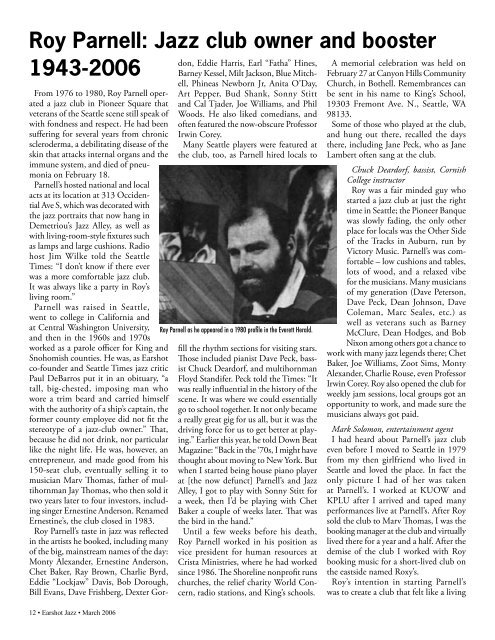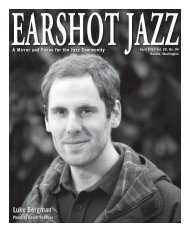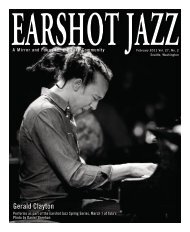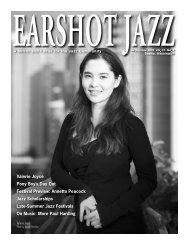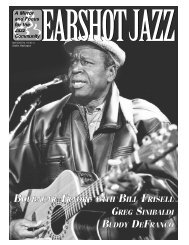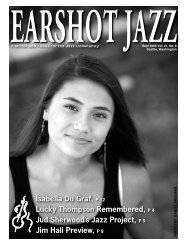Roy Parnell (1943-2006) - Earshot Jazz
Roy Parnell (1943-2006) - Earshot Jazz
Roy Parnell (1943-2006) - Earshot Jazz
Create successful ePaper yourself
Turn your PDF publications into a flip-book with our unique Google optimized e-Paper software.
<strong>Roy</strong> <strong>Parnell</strong>: <strong>Jazz</strong> club owner and booster<br />
<strong>1943</strong>-<strong>2006</strong><br />
From 1976 to 1980, <strong>Roy</strong> <strong>Parnell</strong> operated<br />
a jazz club in Pioneer Square that<br />
veterans of the Seattle scene still speak of<br />
with fondness and respect. He had been<br />
suffering for several years from chronic<br />
scleroderma, a debilitating disease of the<br />
skin that attacks internal organs and the<br />
immune system, and died of pneumonia<br />
on February 18.<br />
<strong>Parnell</strong>’s hosted national and local<br />
acts at its location at 313 Occidential<br />
Ave S, which was decorated with<br />
the jazz portraits that now hang in<br />
Demetriou’s <strong>Jazz</strong> Alley, as well as<br />
with living-room-style fixtures such<br />
as lamps and large cushions. Radio<br />
host Jim Wilke told the Seattle<br />
Times: “I don’t know if there ever<br />
was a more comfortable jazz club.<br />
It was always like a party in <strong>Roy</strong>’s<br />
living room.”<br />
<strong>Parnell</strong> was raised in Seattle,<br />
went to college in California and<br />
at Central Washington University,<br />
and then in the 1960s and 1970s<br />
worked as a parole officer for King and<br />
Snohomish counties. He was, as <strong>Earshot</strong><br />
co-founder and Seattle Times jazz critic<br />
Paul DeBarros put it in an obituary, “a<br />
tall, big-chested, imposing man who<br />
wore a trim beard and carried himself<br />
with the authority of a ship’s captain, the<br />
former county employee did not fit the<br />
stereotype of a jazz-club owner.” That,<br />
because he did not drink, nor particular<br />
like the night life. He was, however, an<br />
entrepreneur, and made good from his<br />
150-seat club, eventually selling it to<br />
musician Marv Thomas, father of multihornman<br />
Jay Thomas, who then sold it<br />
two years later to four investors, including<br />
singer Ernestine Anderson. Renamed<br />
Ernestine’s, the club closed in 1983.<br />
<strong>Roy</strong> <strong>Parnell</strong>’s taste in jazz was reflected<br />
in the artists he booked, including many<br />
of the big, mainstream names of the day:<br />
Monty Alexander, Ernestine Anderson,<br />
Chet Baker, Ray Brown, Charlie Byrd,<br />
Eddie “Lockjaw” Davis, Bob Dorough,<br />
Bill Evans, Dave Frishberg, Dexter Gor-<br />
12 • <strong>Earshot</strong> <strong>Jazz</strong> • March <strong>2006</strong><br />
don, Eddie Harris, Earl “Fatha” Hines,<br />
Barney Kessel, Milt Jackson, Blue Mitchell,<br />
Phineas Newborn Jr, Anita O’Day,<br />
Art Pepper, Bud Shank, Sonny Stitt<br />
and Cal Tjader, Joe Williams, and Phil<br />
Woods. He also liked comedians, and<br />
often featured the now-obscure Professor<br />
Irwin Corey.<br />
Many Seattle players were featured at<br />
the club, too, as <strong>Parnell</strong> hired locals to<br />
<strong>Roy</strong> <strong>Parnell</strong> as he appeared in a 1980 profile in the Everett Herald.<br />
fill the rhythm sections for visiting stars.<br />
Those included pianist Dave Peck, bassist<br />
Chuck Deardorf, and multihornman<br />
Floyd Standifer. Peck told the Times: “It<br />
was really influential in the history of the<br />
scene. It was where we could essentially<br />
go to school together. It not only became<br />
a really great gig for us all, but it was the<br />
driving force for us to get better at playing.”<br />
Earlier this year, he told Down Beat<br />
Magazine: “Back in the ‘70s, I might have<br />
thought about moving to New York. But<br />
when I started being house piano player<br />
at [the now defunct] <strong>Parnell</strong>’s and <strong>Jazz</strong><br />
Alley, I got to play with Sonny Stitt for<br />
a week, then I’d be playing with Chet<br />
Baker a couple of weeks later. That was<br />
the bird in the hand.”<br />
Until a few weeks before his death,<br />
<strong>Roy</strong> <strong>Parnell</strong> worked in his position as<br />
vice president for human resources at<br />
Crista Ministries, where he had worked<br />
since 1986. The Shoreline nonprofit runs<br />
churches, the relief charity World Concern,<br />
radio stations, and King’s schools.<br />
A memorial celebration was held on<br />
February 27 at Canyon Hills Community<br />
Church, in Bothell. Remembrances can<br />
be sent in his name to King’s School,<br />
19303 Fremont Ave. N., Seattle, WA<br />
98133.<br />
Some of those who played at the club,<br />
and hung out there, recalled the days<br />
there, including Jane Peck, who as Jane<br />
Lambert often sang at the club.<br />
Chuck Deardorf, bassist, Cornish<br />
College instructor<br />
<strong>Roy</strong> was a fair minded guy who<br />
started a jazz club at just the right<br />
time in Seattle; the Pioneer Banque<br />
was slowly fading, the only other<br />
place for locals was the Other Side<br />
of the Tracks in Auburn, run by<br />
Victory Music. <strong>Parnell</strong>’s was comfortable<br />
– low cushions and tables,<br />
lots of wood, and a relaxed vibe<br />
for the musicians. Many musicians<br />
of my generation (Dave Peterson,<br />
Dave Peck, Dean Johnson, Dave<br />
Coleman, Marc Seales, etc.) as<br />
well as veterans such as Barney<br />
McClure, Dean Hodges, and Bob<br />
Nixon among others got a chance to<br />
work with many jazz legends there; Chet<br />
Baker, Joe Williams, Zoot Sims, Monty<br />
Alexander, Charlie Rouse, even Professor<br />
Irwin Corey. <strong>Roy</strong> also opened the club for<br />
weekly jam sessions, local groups got an<br />
opportunity to work, and made sure the<br />
musicians always got paid.<br />
Mark Solomon, entertainment agent<br />
I had heard about <strong>Parnell</strong>’s jazz club<br />
even before I moved to Seattle in 1979<br />
from my then girlfriend who lived in<br />
Seattle and loved the place. In fact the<br />
only picture I had of her was taken<br />
at <strong>Parnell</strong>’s. I worked at KUOW and<br />
KPLU after I arrived and taped many<br />
performances live at <strong>Parnell</strong>’s. After <strong>Roy</strong><br />
sold the club to Marv Thomas, I was the<br />
booking manager at the club and virtually<br />
lived there for a year and a half. After the<br />
demise of the club I worked with <strong>Roy</strong><br />
booking music for a short-lived club on<br />
the eastside named Roxy’s.<br />
<strong>Roy</strong>’s intention in starting <strong>Parnell</strong>’s<br />
was to create a club that felt like a living


